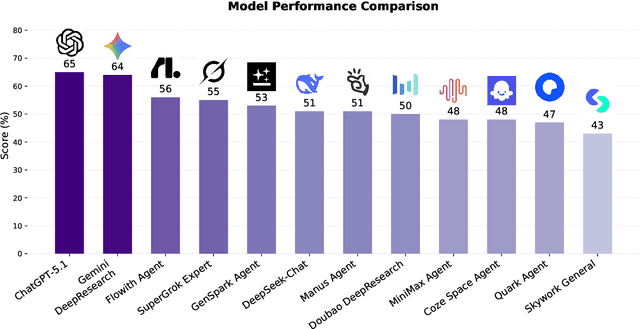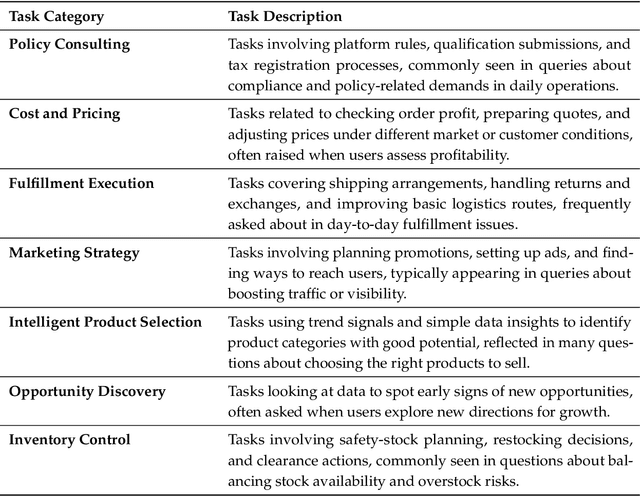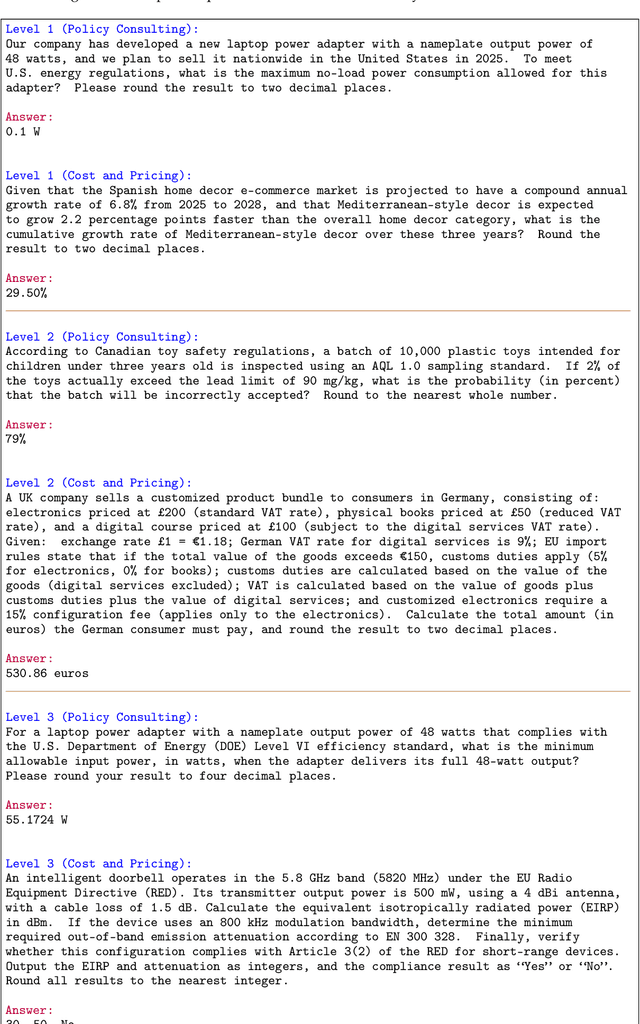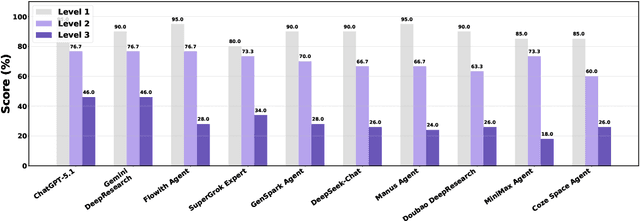Yong Jiang
Efficient Multimodal Planning Agent for Visual Question-Answering
Jan 28, 2026Abstract:Visual Question-Answering (VQA) is a challenging multimodal task that requires integrating visual and textual information to generate accurate responses. While multimodal Retrieval-Augmented Generation (mRAG) has shown promise in enhancing VQA systems by providing more evidence on both image and text sides, the default procedure that addresses VQA queries, especially the knowledge-intensive ones, often relies on multi-stage pipelines of mRAG with inherent dependencies. To mitigate the inefficiency limitations while maintaining VQA task performance, this paper proposes a method that trains a multimodal planning agent, dynamically decomposing the mRAG pipeline to solve the VQA task. Our method optimizes the trade-off between efficiency and effectiveness by training the agent to intelligently determine the necessity of each mRAG step. In our experiments, the agent can help reduce redundant computations, cutting search time by over 60\% compared to existing methods and decreasing costly tool calls. Meanwhile, experiments demonstrate that our method outperforms all baselines, including a Deep Research agent and a carefully designed prompt-based method, on average over six various datasets. Code will be released.
CP Loss: Channel-wise Perceptual Loss for Time Series Forecasting
Jan 25, 2026Abstract:Multi-channel time-series data, prevalent across diverse applications, is characterized by significant heterogeneity in its different channels. However, existing forecasting models are typically guided by channel-agnostic loss functions like MSE, which apply a uniform metric across all channels. This often leads to fail to capture channel-specific dynamics such as sharp fluctuations or trend shifts. To address this, we propose a Channel-wise Perceptual Loss (CP Loss). Its core idea is to learn a unique perceptual space for each channel that is adapted to its characteristics, and to compute the loss within this space. Specifically, we first design a learnable channel-wise filter that decomposes the raw signal into disentangled multi-scale representations, which form the basis of our perceptual space. Crucially, the filter is optimized jointly with the main forecasting model, ensuring that the learned perceptual space is explicitly oriented towards the prediction task. Finally, losses are calculated within these perception spaces to optimize the model. Code is available at https://github.com/zyh16143998882/CP_Loss.
Generalization Bounds for Transformer Channel Decoders
Jan 11, 2026Abstract:Transformer channel decoders, such as the Error Correction Code Transformer (ECCT), have shown strong empirical performance in channel decoding, yet their generalization behavior remains theoretically unclear. This paper studies the generalization performance of ECCT from a learning-theoretic perspective. By establishing a connection between multiplicative noise estimation errors and bit-error-rate (BER), we derive an upper bound on the generalization gap via bit-wise Rademacher complexity. The resulting bound characterizes the dependence on code length, model parameters, and training set size, and applies to both single-layer and multi-layer ECCTs. We further show that parity-check-based masked attention induces sparsity that reduces the covering number, leading to a tighter generalization bound. To the best of our knowledge, this work provides the first theoretical generalization guarantees for this class of decoders.
WebAnchor: Anchoring Agent Planning to Stabilize Long-Horizon Web Reasoning
Jan 07, 2026Abstract:Large Language Model(LLM)-based agents have shown strong capabilities in web information seeking, with reinforcement learning (RL) becoming a key optimization paradigm. However, planning remains a bottleneck, as existing methods struggle with long-horizon strategies. Our analysis reveals a critical phenomenon, plan anchor, where the first reasoning step disproportionately impacts downstream behavior in long-horizon web reasoning tasks. Current RL algorithms, fail to account for this by uniformly distributing rewards across the trajectory. To address this, we propose Anchor-GRPO, a two-stage RL framework that decouples planning and execution. In Stage 1, the agent optimizes its first-step planning using fine-grained rubrics derived from self-play experiences and human calibration. In Stage 2, execution is aligned with the initial plan through sparse rewards, ensuring stable and efficient tool usage. We evaluate Anchor-GRPO on four benchmarks: BrowseComp, BrowseComp-Zh, GAIA, and XBench-DeepSearch. Across models from 3B to 30B, Anchor-GRPO outperforms baseline GRPO and First-step GRPO, improving task success and tool efficiency. Notably, WebAnchor-30B achieves 46.0% pass@1 on BrowseComp and 76.4% on GAIA. Anchor-GRPO also demonstrates strong scalability, getting higher accuracy as model size and context length increase.
AODDiff: Probabilistic Reconstruction of Aerosol Optical Depth via Diffusion-based Bayesian Inference
Dec 31, 2025Abstract:High-quality reconstruction of Aerosol Optical Depth (AOD) fields is critical for Atmosphere monitoring, yet current models remain constrained by the scarcity of complete training data and a lack of uncertainty quantification.To address these limitations, we propose AODDiff, a probabilistic reconstruction framework based on diffusion-based Bayesian inference. By leveraging the learned spatiotemporal probability distribution of the AOD field as a generative prior, this framework can be flexibly adapted to various reconstruction tasks without requiring task-specific retraining. We first introduce a corruption-aware training strategy to learns a spatiotemporal AOD prior solely from naturally incomplete data. Subsequently, we employ a decoupled annealing posterior sampling strategy that enables the more effective and integration of heterogeneous observations as constraints to guide the generation process. We validate the proposed framework through extensive experiments on Reanalysis data. Results across downscaling and inpainting tasks confirm the efficacy and robustness of AODDiff, specifically demonstrating its advantage in maintaining high spatial spectral fidelity. Furthermore, as a generative model, AODDiff inherently enables uncertainty quantification via multiple sampling, offering critical confidence metrics for downstream applications.
Nested Browser-Use Learning for Agentic Information Seeking
Dec 29, 2025Abstract:Information-seeking (IS) agents have achieved strong performance across a range of wide and deep search tasks, yet their tool use remains largely restricted to API-level snippet retrieval and URL-based page fetching, limiting access to the richer information available through real browsing. While full browser interaction could unlock deeper capabilities, its fine-grained control and verbose page content returns introduce substantial complexity for ReAct-style function-calling agents. To bridge this gap, we propose Nested Browser-Use Learning (NestBrowse), which introduces a minimal and complete browser-action framework that decouples interaction control from page exploration through a nested structure. This design simplifies agentic reasoning while enabling effective deep-web information acquisition. Empirical results on challenging deep IS benchmarks demonstrate that NestBrowse offers clear benefits in practice. Further in-depth analyses underscore its efficiency and flexibility.
AutoForge: Automated Environment Synthesis for Agentic Reinforcement Learning
Dec 28, 2025Abstract:Conducting reinforcement learning (RL) in simulated environments offers a cost-effective and highly scalable way to enhance language-based agents. However, previous work has been limited to semi-automated environment synthesis or tasks lacking sufficient difficulty, offering little breadth or depth. In addition, the instability of simulated users integrated into these environments, along with the heterogeneity across simulated environments, poses further challenges for agentic RL. In this work, we propose: (1) a unified pipeline for automated and scalable synthesis of simulated environments associated with high-difficulty but easily verifiable tasks; and (2) an environment level RL algorithm that not only effectively mitigates user instability but also performs advantage estimation at the environment level, thereby improving training efficiency and stability. Comprehensive evaluations on agentic benchmarks, including tau-bench, tau2-Bench, and VitaBench, validate the effectiveness of our proposed method. Further in-depth analyses underscore its out-of-domain generalization.
VSA:Visual-Structural Alignment for UI-to-Code
Dec 23, 2025


Abstract:The automation of user interface development has the potential to accelerate software delivery by mitigating intensive manual implementation. Despite the advancements in Large Multimodal Models for design-to-code translation, existing methodologies predominantly yield unstructured, flat codebases that lack compatibility with component-oriented libraries such as React or Angular. Such outputs typically exhibit low cohesion and high coupling, complicating long-term maintenance. In this paper, we propose \textbf{VSA (VSA)}, a multi-stage paradigm designed to synthesize organized frontend assets through visual-structural alignment. Our approach first employs a spatial-aware transformer to reconstruct the visual input into a hierarchical tree representation. Moving beyond basic layout extraction, we integrate an algorithmic pattern-matching layer to identify recurring UI motifs and encapsulate them into modular templates. These templates are then processed via a schema-driven synthesis engine, ensuring the Large Language Model generates type-safe, prop-drilled components suitable for production environments. Experimental results indicate that our framework yields a substantial improvement in code modularity and architectural consistency over state-of-the-art benchmarks, effectively bridging the gap between raw pixels and scalable software engineering.
EcomBench: Towards Holistic Evaluation of Foundation Agents in E-commerce
Dec 11, 2025



Abstract:Foundation agents have rapidly advanced in their ability to reason and interact with real environments, making the evaluation of their core capabilities increasingly important. While many benchmarks have been developed to assess agent performance, most concentrate on academic settings or artificially designed scenarios while overlooking the challenges that arise in real applications. To address this issue, we focus on a highly practical real-world setting, the e-commerce domain, which involves a large volume of diverse user interactions, dynamic market conditions, and tasks directly tied to real decision-making processes. To this end, we introduce EcomBench, a holistic E-commerce Benchmark designed to evaluate agent performance in realistic e-commerce environments. EcomBench is built from genuine user demands embedded in leading global e-commerce ecosystems and is carefully curated and annotated through human experts to ensure clarity, accuracy, and domain relevance. It covers multiple task categories within e-commerce scenarios and defines three difficulty levels that evaluate agents on key capabilities such as deep information retrieval, multi-step reasoning, and cross-source knowledge integration. By grounding evaluation in real e-commerce contexts, EcomBench provides a rigorous and dynamic testbed for measuring the practical capabilities of agents in modern e-commerce.
IterResearch: Rethinking Long-Horizon Agents via Markovian State Reconstruction
Nov 10, 2025Abstract:Recent advances in deep-research agents have shown promise for autonomous knowledge construction through dynamic reasoning over external sources. However, existing approaches rely on a mono-contextual paradigm that accumulates all information in a single, expanding context window, leading to context suffocation and noise contamination that limit their effectiveness on long-horizon tasks. We introduce IterResearch, a novel iterative deep-research paradigm that reformulates long-horizon research as a Markov Decision Process with strategic workspace reconstruction. By maintaining an evolving report as memory and periodically synthesizing insights, our approach preserves consistent reasoning capacity across arbitrary exploration depths. We further develop Efficiency-Aware Policy Optimization (EAPO), a reinforcement learning framework that incentivizes efficient exploration through geometric reward discounting and enables stable distributed training via adaptive downsampling. Extensive experiments demonstrate that IterResearch achieves substantial improvements over existing open-source agents with average +14.5pp across six benchmarks and narrows the gap with frontier proprietary systems. Remarkably, our paradigm exhibits unprecedented interaction scaling, extending to 2048 interactions with dramatic performance gains (from 3.5\% to 42.5\%), and serves as an effective prompting strategy, improving frontier models by up to 19.2pp over ReAct on long-horizon tasks. These findings position IterResearch as a versatile solution for long-horizon reasoning, effective both as a trained agent and as a prompting paradigm for frontier models.
 Add to Chrome
Add to Chrome Add to Firefox
Add to Firefox Add to Edge
Add to Edge